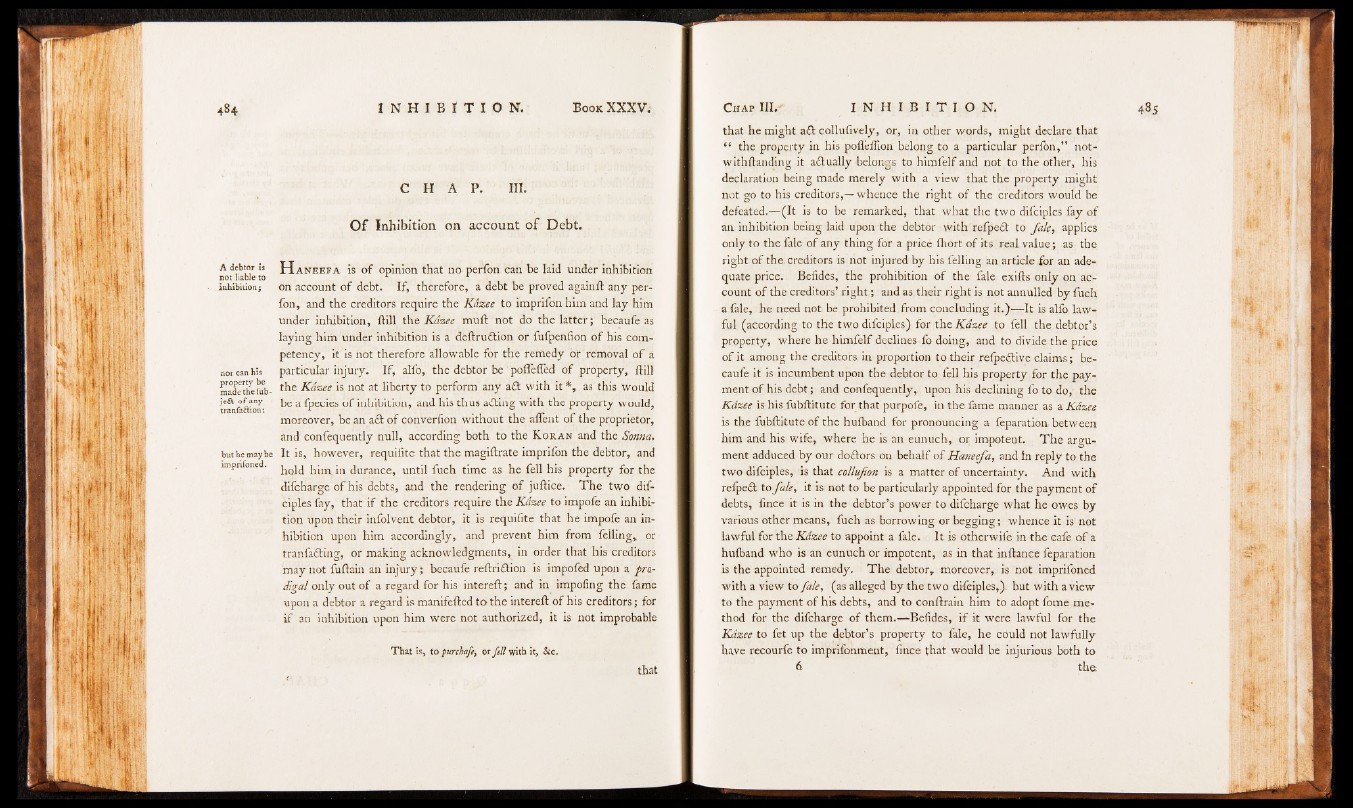
A debtor is
not liable to
inhibition ;
nor can his
property be
made thefub-
je ft o f any
tranfaftion:
but he maybe
imprifoned.
C H A P . III.
Of Inhibition on account of Debt.
H aneefa is of opinion that no perfon can be laid under inhibition
on account of debt. If, therefore, a debt be proved againft any perfon,
and the creditors require the Kdzee to imprifon him and lay him
under inhibition, {till the Kdzee mult not do the latter; becaufe as
laying him under inhibition is a deftruftion or fufpenfion of his competency,
it is not therefore allowable for the remedy or removal o f a
particular injury. If, alfo, the debtor be pofleffed of property, {till
the Kdzee is not at liberty to perform any aft with it* , as this would
be a fpecies of inhibition, and his thus afting with the property would,
moreover, be an aft of converfion without the afient of the proprietor,
and confoquently null, according both to the Koran and the Sonna.
It is, however, requilite that the magiftrate imprifon the debtor, and
hold him. in durance, until fuch time as he fell his property for the
difcharge of his debts, and the rendering of juftice. The two dif-
ciples fay, that if the creditors require the Kdzee to impofe an inhibition
upon their infolvent debtor, it is requifite that he impofe an inhibition
upon him accordingly, and prevent him from felling, or
tranfafting, or making acknowledgments,_ in order that his creditors
may not fuftain an injury; becaufe reftriftion is impofed upon a fra-
digal only out of a regard for his intereft; and in impofing the fame
upon a debtor a regard is manifefted to the intereft of his creditors; for
if an inhibition upon him were not authorized, it is not improbable
That is, to purchafex or fell with it, &c.
that
that he might aft collufively, or, in other words, might declare that
“ the property in his pofleflion belong to a particular perfon,” not-
withftanding it aftually belongs to himfelf and not to the other, his
declaration being made merely with a view that the property might
not go to his creditors,— whence the right of the creditors would be
defeated.— (It is to be remarked, that what the two difciples fay of
an inhibition being laid upon the debtor with'refpeft to fa le, applies
only to the fale of any thing for a price fliort of its real value; as the
right of the, creditors is not injured by his felling an article for an adequate
price. Befides, the prohibition of the fale exifts only on account
of the creditors’ right; and as their right is not annulled by fuch
a fale, he need not be prohibited from concluding it.)— It is alfo lawful
(according to the two difciples) for the Kdzee to fell the debtor’ s
property, where he himfelf declines fo doing, and to divide the price
of it among the creditors in pj-oportion to their refpeftive claims; becaufe
it is incumbent upon the debtor to fell his property for the payment
of his debt; and confoquently, upon his declining fo to do, the
Kdzee is his fubftitute for that purpofe, in the fame manner as a Kdzee
is the fubftitute of the hufband for pronouncing a feparation. between
him and his; wife, where he is an eunuch, or impotent. The argument
adduced by our doftors on behalf o f Haneefa, and In reply to the
two difciples, is that collufiort is a matter of uncertainty. And with
refpeft to fale, it is not to be particularly appointed for the payment of
debts, fince it is in the debtor’s power to difcharge what he owes by
various other means, fuch as borrowing or begging; whence it is not
lawful for the Kdzee to appoint a fale. It is otherwife in the cafe o f a
hufband who is an eunuch or impotent, as in that inftanee feparation
is the appointed remedy. The debtor, moreover, is not imprifoned
with a view to fale, (as alleged by the two difciples,). hut with a view
to the payment of his debts, and to conftrain him to adopt fome method
for the difcharge of them.— Befides, i f it were lawful for the
Kdzee to fet up the debtor’ s property to fale, he could not lawfully
have recourfe to imprifonmeut, fince that would be injurious both to
6 the